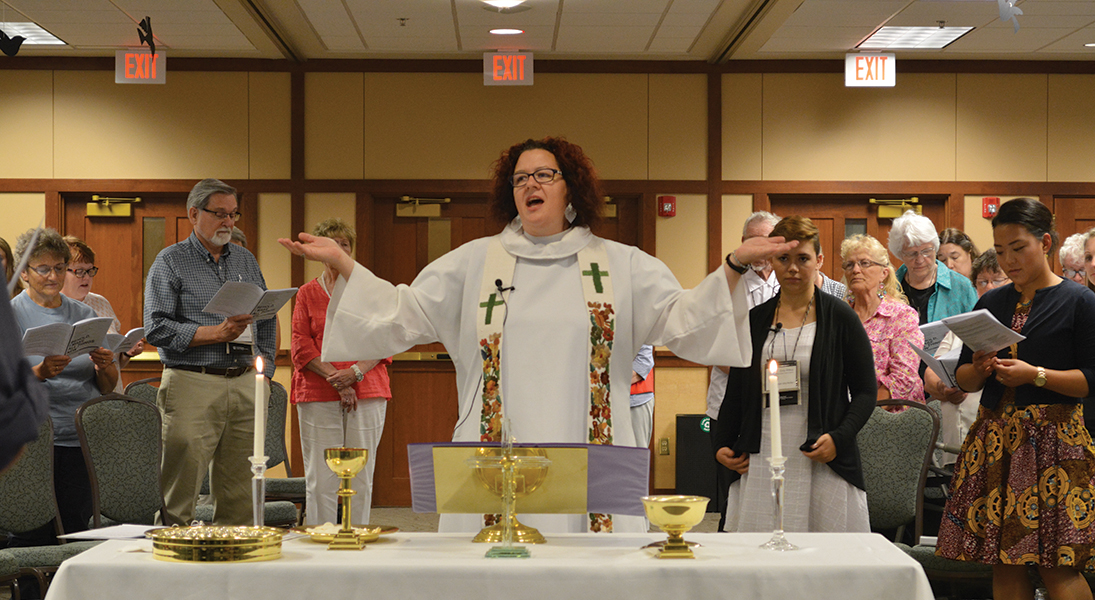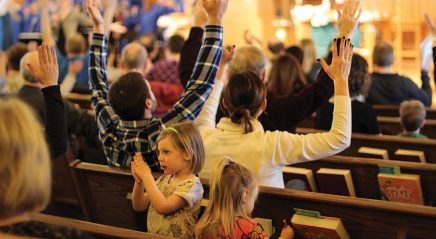Editor’s note: Our June cover story, “Worship 101,” examined the “whats, whys and hows” of ELCA worship. We now continue the story as a monthly online series further exploring what Lutheran worship is, how Lutherans worship and why we do so.
I recently read a list of “20 rules of etiquette for attending worship” shared by a clergyperson (not of my denomination). They were things people needed to do if they wanted to do worship “right”—such as never giving kids snacks; never looking at cell phones; bowing, sitting, standing and kneeling at all the right times; dressing in a certain way, etc. In response, I thought I’d share my own clergy list of etiquette.
1. I assume that, when you walk into church, you feel weighed down by the world. You probably had a hard week at work or failed on your diet or argued again with your spouse or have had it up to here with the kids. I could be wrong, but I assume you need a break. My job is to smile and welcome you. Your “rule” here is simply to walk in the door, if you choose.
2. As our guest of honor, you are in church to be served. This means you do not come to serve God or anyone else. Before you worry that this will make you feel entitled, remember that the gathering commonly called “mass” was renamed “service” by Martin Luther, who said God is the one serving. God is lavishly serving you in word and sacrament. This is not to make you feel entitled but to make you feel loved and free to love others. (You will know when God puts it on your heart to serve others, prompted by your overflowing love.) So your “rule” here is to try to open your heart to God, who will serve you as you worship and praise God. It’s not really a rule but a good idea. You’ll get more out of things this way.
3. The music is always nicer if you sing along. The prayers are more powerful if you join your voice in the ancient rhythm created by billions of people over thousands of years. You’ll get more out of the sermon if you listen. So your “rule”—let’s call it a suggestion—is to involve yourself in what we call “the work of the people,” which is what “liturgy” literally means. It’s not a requirement, though. If what you need to do is sit in silence, cry, meditate, whatever—have at it.
Rules and requirements won’t save you, me or anyone. Salvation was—and is—a gift from the cross.
4. Parents and grandparents, we give you all the breaks you need. Jesus loved kids and loves yours. Feed them Cheerios, give them toys—yes, quiet ones would be nice—step out of the sanctuary if you want, utilize the nursery and Sunday-school options, and ask your neighbors for help. Many of us have been there, and you’re doing great. (I can preach with kids in the room. I just get louder!) If they are loud, do your best—but know that we love you and we love them.
5. The table is owned by Jesus Christ. He called you and all people to join in Holy Communion. I will never withhold the sacrament from anyone. (It’s not mine to withhold.) Don’t feel worthy? Well, Jesus fed Judas. It’s not about worthiness; it’s about God’s love for you. Feel better? Good. Get up here and let me put bread in your hand!
6. Ask me anything about worship that you want to understand but know that it all unfolds over time and that we all grow, as we should, over a lifetime.
7. Cell phones are best kept quiet—but hey, pull it out to tweet an interesting sermon note (I do say some tweet-worthy things sometimes). Record, go “live,” spread the gospel in new ways. No rule here either.
8. Wear whatever you want. This is the most irrelevant thing in the history of ever.
9. Your love of God pales in comparison to God’s love of you. If you are a persistent troublemaker, I’ll let you know. But regardless of your culture or background, if you are wounded, broken, anxious, insecure, depressed, or unsure if you even believe in God, you will not be judged by God or our congregation. Bring your authentically human self to the worship service—and see how much God serves you in profound and soul-healing ways.
10. Relax.
Rules and requirements won’t save you, me or anyone. Salvation was—and is—a gift from the cross. If any of us could have earned salvation by being the perfect churchgoer, the cross wouldn’t have been necessary. I assume that we’re all trying our best with what we know. But our trying is nothing compared to God’s love. The mercy flows from God into our hearts.









